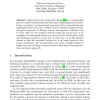Free Online Productivity Tools
i2Speak
i2Symbol
i2OCR
iTex2Img
iWeb2Print
iWeb2Shot
i2Type
iPdf2Split
iPdf2Merge
i2Bopomofo
i2Arabic
i2Style
i2Image
i2PDF
iLatex2Rtf
Sci2ools
PKC
1998
Springer
1998
Springer
A Signcryption Scheme with Signature Directly Verifiable by Public Key
Signcryption, first proposed by Zheng [4,5], is a cryptographic primitive which combines both the functions of digital signature and public key encryption in a logical single step, and with a computational cost significantly lower than that needed by the traditional signature-thenencryption approach. In Zheng's scheme, the signature verification can be done either by the recipient directly (using his private key) or by engaging a zero-knowledge interactive protocol with a third party, without disclosing recipient's private key. In this note, we modify Zheng's scheme so that the recipient's private key is no longer needed in signature verification. The computational cost of the modified scheme is higher than that of Zheng's scheme but lower than that of the signaturethen-encryption approach.
| Added | 06 Aug 2010 |
| Updated | 06 Aug 2010 |
| Type | Conference |
| Year | 1998 |
| Where | PKC |
| Authors | Feng Bao, Robert H. Deng |
Comments (0)

